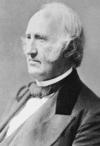- Phillips, Wendell
-
born Nov. 29, 1811, Boston, Mass., U.S.died Feb. 2, 1884, BostonU.S. reformer and abolitionist.A wealthy graduate of Harvard Law School, he sacrificed social status and a prospective political career in order to join the antislavery movement. His reputation as an inspirational orator was established with his address at an abolitionist meeting in 1837 to protest the murder of Elijah Lovejoy. He became an associate of William Lloyd Garrison and lectured widely at meetings of the American Anti-Slavery Society, serving as its president from 1865 to 1870. He also advocated prohibition, woman suffrage, prison reform, regulation of corporations, and labour reform.
 Wendell PhillipsLibrary of Congress, Washington, D.C.
Wendell PhillipsLibrary of Congress, Washington, D.C.* * *
▪ American abolitionistborn November 29, 1811, Boston, Massachusetts, U.S.died February 2, 1884, Bostonabolitionist crusader whose oratorical eloquence helped fire the antislavery cause during the period leading up to the American Civil War.After opening a law office in Boston, Phillips, a wealthy Harvard Law School graduate, sacrificed social status and a prospective political career in order to join the antislavery movement. He became a close associate of the abolitionist leader William Lloyd Garrison (Garrison, William Lloyd) and began lecturing for antislavery societies, writing pamphlets and editorials for Garrison's The Liberator, and contributing financially to the abolition movement (abolitionism).Phillips's reputation as an orator was established at Faneuil Hall, Boston (December 8, 1837), at a meeting called to protest the murder of abolitionist Elijah Lovejoy (Lovejoy, Elijah P.) at Alton, Illinois, the previous month. When Phillips spontaneously delivered a stirring and passionate denunciation of the mob action against the martyred editor, he was recognized as one of the most brilliant orators of his day.As a reform crusader, Phillips allied himself with Garrison in refusing to link abolition with political action; together they condemned the federal Constitution for its compromises over slavery and advocated national disunion rather than continued association with the slave states. During the Civil War (1861–65) he assailed President Abraham Lincoln (Lincoln, Abraham)'s reluctance to uproot slavery at once, and after the Emancipation Proclamation (January 1863) he threw his support to full civil liberties for freedmen. In 1865 he became president of the American Anti-Slavery Society after Garrison resigned.After the Civil War, Phillips also devoted himself to temperance, women's rights, universal suffrage, and the Greenback Party (Greenback movement) (a minor political movement). He was an unsuccessful Massachusetts gubernatorial candidate of the Labor Reform and Prohibition parties in 1870. He continued to lecture on the lyceum circuits until the 1880s.* * *
Universalium. 2010.
